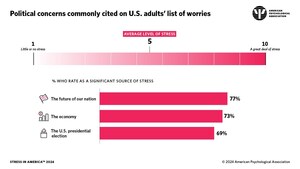Few Americans aware of their rights for mental health coverage
APA survey reveals only 4 percent of Americans know about mental health parity law.
WASHINGTON, May 20, 2014 /PRNewswire-USNewswire/ -- Even though more than one in four Americans (27 percent) have received treatment or therapy from a mental health professional, few people know that health insurers are required to provide coverage for mental health, behavioral health and substance-use disorders that is comparable to coverage for physical health, according to a new survey from the American Psychological Association (APA).
The Mental Health Parity and Addiction Equity Act was passed in 2008, but only 4 percent of Americans say they are aware of the law, according to the survey which was commissioned by the APA and conducted online between March 7 and 24, 2014, among more than 1,000 adult Americans by Harris Poll. Despite increased national attention on mental health and access to services, in particular with the ongoing National Dialogue on Mental Health led by the White House, awareness of the law has not increased since APA last surveyed on this issue in 2010.
"More access to mental health care is the rallying cry, but the simple fact is many people may already have coverage and not know it or not understand how to use it," said Katherine C. Nordal Ph.D., APA's executive director for professional practice. "The mental health parity law, together with the Affordable Care Act, has expanded mental health treatment opportunities to many Americans in need who may otherwise have gone untreated. But laws don't have the intended effect when people don't know that they exist."
Under the parity law, insurance companies must provide mental and behavioral health coverage that is equal to or better than coverage for physical health, with no annual limits or higher co-pays or deductibles for treatment of mental health disorders or substance use. The law applies to most employer-provided health plans and to individual plans purchased through the new state and federal health insurance exchanges.
While the APA survey found that 61 percent of adults reported that they have adequate mental health coverage, many report details of their insurance coverage that are at odds with provisions of the parity law. Almost three in ten (29 percent) of Americans said their insurance has different co-pays or other limits for mental health care. Almost one in four (24 percent) said they aren't sure if their insurance offers the same coverage for mental and physical health, and only slightly more than one half of people (56 percent) said that their current health insurance provides coverage to see a psychologist or other mental health professional.
According to results from APA's survey, when asked why they or a family member would not seek treatment, concerns about the cost of treatment was the most frequently cited reason, with more than one in five (22 percent) saying that cost was a barrier to seeking treatment. When asked what information they would need before being treated by a psychologist or mental health professional, 75 percent said they would need to know if they take insurance, whereas 68 percent said they would need to know if they are comfortable with their provider.
APA has developed resources, including a consumer guide and an informative video to help educate the public about their mental health coverage which is available at http://on.apa.org/parity-law
Mental health disorders are the leading cause of disability in the United States and Canada. According to the Substance Abuse and Mental Health Services Administration (SAMHSA), more than 41 million Americans were estimated to experience mental illness in 2012, the most recent year for which figures are available. SAMHSA also reports that an estimated 10.7 million Americans had an unmet need for mental health treatment.
This survey was conducted online within the United States by the Harris Poll on behalf of the American Psychological Association between March 7 and 24, 2014 among 1,000 adults aged 18+ who reside in the U.S. A full methodology is available at http://on.apa.org/parity-law.
The American Psychological Association, in Washington, D.C., is the largest scientific and professional organization representing psychology in the United States. APA's membership includes nearly 130,000 researchers, educators, clinicians, consultants and students. Through its divisions in 54 subfields of psychology and affiliations with 60 state, territorial and Canadian provincial associations, APA works to advance the creation, communication and application of psychological knowledge to benefit society and improve people's lives.
SOURCE American Psychological Association
WANT YOUR COMPANY'S NEWS FEATURED ON PRNEWSWIRE.COM?
Newsrooms &
Influencers
Digital Media
Outlets
Journalists
Opted In





Share this article